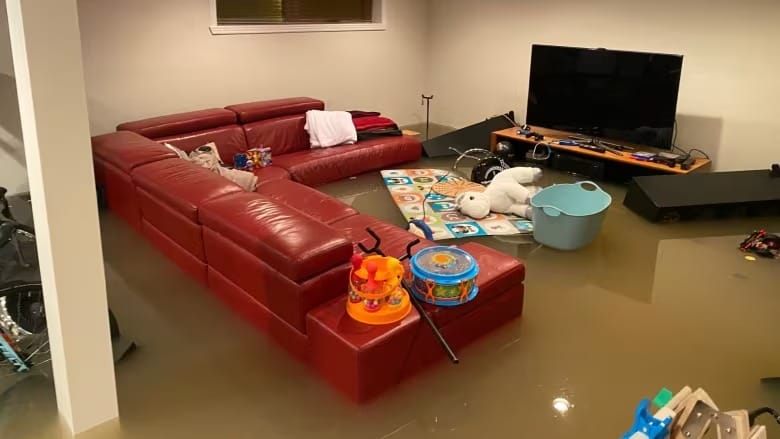Basement-free buildings are better for the future climate
Politicians mull bans due to flooding, but costs and carbon emissions also a concern

In July, heavy rains caused extensive flooding in Ontario, leading to $940 million in insured damages, followed by an additional $2.5 billion in Quebec just weeks later, according to the Insurance Bureau of Canada.
With climate change increasing the risk of extreme rainfall and flooding, particularly in southern Ontario and Quebec, some Montreal-area politicians have proposed or enacted restrictions on building basements—the most flood-prone area of a home—in vulnerable regions.
Research has also highlighted that the construction of basements, which requires large amounts of concrete, contributes significantly to greenhouse gas emissions, further exacerbating climate change. This has raised questions about whether it's time to reconsider building them altogether.
The Emergence of Basement Bans
In June, the Montreal borough of Ville-Marie introduced rules prohibiting homeowners from converting basements into living spaces in flood-prone areas unless the building is waterproofed to handle heavy rains.
Then, in August, after the remnants of Tropical Storm Debby unleashed record-breaking floods across southern Quebec, Lachine borough mayor Maja Vodanovic called for a ban on constructing new basement apartments in flood-risk areas.
"We don't want to create a problem that we know is going to happen," Vodanovic said during a city council meeting.
There is precedent for such regulations. Craig Stewart, vice-president of climate change and federal issues at the Insurance Bureau of Canada, pointed out that after flooding along the Ottawa River, Ontario offered disaster relief funds to homeowners on the condition that they elevate their homes above potential flood levels—often by foregoing basements entirely. "No basement... so that it's well above the possible flood level," he explained, emphasizing that this is becoming a standard practice in some municipalities and provinces.
Rising Flood Risks
Basements have traditionally been a common feature in Canadian homes, helping to position the foundation below the frost line to prevent damage from freezing and thawing. However, Environment Canada warns that storms that used to occur once every 100 years may now happen every 20, or even every five years in some areas, due to climate change.
Aging urban infrastructure, which was not designed to accommodate the growing population or the increasingly wetter climate, is further compounding flood risks, especially in basements.
Bernard Deschamps, who worked in the insurance industry for 35 years and now researches the topic for his PhD at the University of Quebec at Montreal (UQAM), suggests regulating or even banning basements in new constructions in flood zones. "It makes no sense to have a basement in flood-prone areas," he said.
The Environmental Impact of Basements
Besides their flood vulnerability, basements also have a significant environmental downside—they contribute heavily to a building’s carbon footprint due to the large amounts of concrete required for construction.
Shoshanna Saxe, Canada Research Chair in sustainable infrastructure at the University of Toronto, noted that basements accounted for an average of 56 percent of a building's material usage, which translates to higher greenhouse gas emissions.
She pointed out that new homes, especially in Ontario, are getting bigger, and so are their basements—sometimes featuring playrooms and nine-foot ceilings. This trend not only increases carbon emissions but also heightens flood risks due to the basement’s lower positioning relative to water levels.
Saxe argued that building without basements reduces both flood risk and carbon emissions, while also lowering construction costs and speeding up the building process. “Without basements, buildings would be much cheaper and faster to build,” she said.
Are Basements Necessary?
Saxe acknowledged that basements are traditionally used to position a home’s foundation below the frost line, but alternative methods, such as pile foundations, can serve the same purpose. Many regions around the world, including the southern U.S. and Australia, build homes without basements due to local climate and soil conditions, and these homes often have a much lower carbon footprint compared to Canadian homes.
She suggested that building height restrictions in Canada push people to build larger basements. "People would be just as happy to go up as down, but they’re not allowed," she explained, advocating for different regulatory approaches.
Toronto has already revised its bylaws for multiplex buildings to encourage above-ground construction, partly to mitigate climate impacts. Similarly, Montreal’s Ville-Marie borough lifted height restrictions to offset the loss of basement space under its new regulations.
For existing basements and basement apartments, both Deschamps and Saxe advocate for flood-proofing measures to preserve their utility, as they already exist and serve as valuable housing. "They’re not taking more materials to create," Saxe said, "and they provide a really valuable form of housing."





